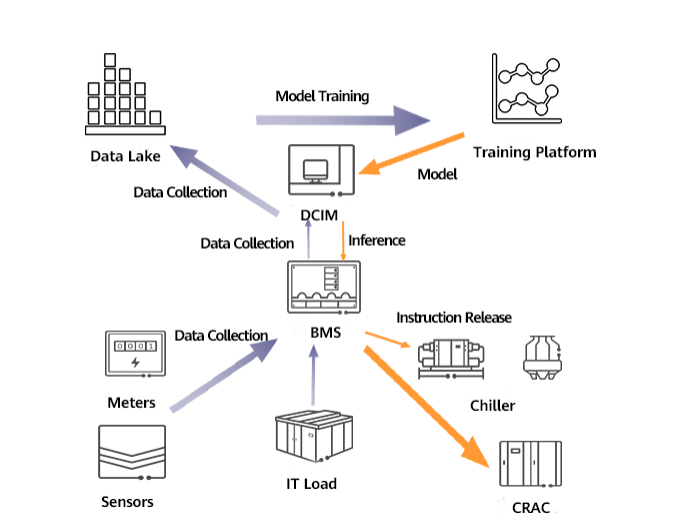Huawei's Smart Modular Data Center Helps Upgrade China Unicom's Communications Equipment Room
Produits, solutions et services pour les entreprises
Akıllı Telefonlar, Bilgisayar&Tabletler, Giyilebilirler ve Daha Fazlası
From lining up to make toll calls and connecting to the Internet over telephone lines, to gigabit broadband, ubiquitous connectivity, and upcoming 5G networks, the transformation and overhaul of communication modes are pumped up by technological innovations in the communications industry. In this era that’s placing so much emphasis on dedication, innovation helps enterprises survive.
As the only telecom carrier listed in New York, Hong Kong, and Shanghai, China Unicom pioneers the evolution of technological innovation. For example, China Unicom piloted the AI cloud ship project in Qingdao.
The AI cloud ship project was jointly set up by China Unicom’s Shandong Branch and Huawei. A better Power Usage Effectiveness (PUE) was achieved after the AI technology was introduced and leveraged based on the China Unicom Cloud 1.0. Moreover, energy saving was further enhanced thanks to the AI energy saving optimization algorithm that consolidated the cooling requirements of IT cabinets, the server layout in a cloud ship, and air conditioner energy efficiency. In addition, Huawei smart modules were used to upgrade a traditional telecom equipment room to a Data Center (DC) for the AI cloud ship project, exploring the possibility of smart modular data center construction and intelligent O&M of telecom equipment rooms.
Shandong has more than 100 million people and serves as the economic engine on the eastern coast of China. However, there is still much room to improve network coverage and quality in many areas in Shandong. To further expand the network coverage and upgrade the existing network, China Unicom launched a pilot project, the AI cloud ship, as a new solution for hybrid deployment of IT and CT devices in Shandong province.
The major problems confronting the AI cloud ship project were as follows: Firstly, with the increasing integration of chipsets and higher IT power density, problems such as uneven heat dissipation, insufficient hot spots, poor airflow management, and high power consumption occurred in many equipment rooms. Secondly, when the equipment rooms were cloudified, CT devices with standard dimensions and ones with non-standard dimensions coexisted for a long time; therefore, flexible deployment and capacity expansion were the primary challenges for China Unicom. Using an integrated solution to deploy new technologies is a tough and demanding task.
Huawei's innovative iCooling@AI technology can resolve uneven heat dissipation and high power consumption.
Huawei's innovative iCooling@AI technology performs dynamic modeling based on the workload and cooling unit output, and enables the cooling capability to adapt to the actual workload to ensure the optimal working mode of the cooling system.

The actual operation of the AI cloud ship project also verified the effect of the forward-looking iCooling@AI technology. In the new architecture, the airflow and heat management were well organized. Compared with the traditional equipment room architecture, the new architecture established on the iCooling@AI technology reduced the PUE of the AI cloud ship project by 8% even in the hottest and most humid summer, creating a model for green and energy-saving intelligent data centers. In addition, Huawei’s intelligent data center management system NetEco6000 was leveraged to slash O&M costs through the implementation of digital O&M, AI diagnosis and optimization, and lifecycle management.
Huawei’s smart modular data center promoted the upgrade of traditional communication equipment rooms of Shandong Unicom.
Huawei’s smart modular data center supports fast deployment and flexible capacity expansion, facilitating the upgrade of traditional communications equipment rooms. The Huawei smart modular data center provided modular components and standard ports to achieve fast deployment and flexible capacity expansion of the AI cloud ship project. At present, the AI cloud ship project is designed to support a power density range of 3 kW to 8 kW for each rack (can be expanded to more than 10 kW/rack when in-row Computer Room Air Conditioners (CRACs) are applied), allowing for flexible service expansion.
Currently, the AI cloud ship project using Huawei’s smart modular data center has been built and put into use in the second hub equipment room of China Unicom’s Shandong Branch in Qingdao. The fact that the actual PUE is optimized by 8% indicates that the project was a success. The project has also been recognized by the industry, being awarded 'Smart Data Center' at the Datacenter Dynamics (DCD) Asia Pacific awards – often known as the 'Oscars of the data center industry' – held in 2018. More importantly, the success of the pilot project will not only create huge benefits for China Unicom, but also increase the connectivity of millions of people and promote the transition from an economic world to a fully-connected, intelligent world.

Tian Jun, Senior Project Manager of the Network Development Department of China Unicom Shandong Branch stated, "As the innovation practitioner of the cloud ship concept of the China Unicom Group, China Unicom’s Shandong Branch cooperates closely with Huawei to upgrade the traditional communications equipment rooms. This effectively resolves the problem of ICT convergence. In addition, the AI technology is used to perform modeling based on the cooling requirements of IT cabinets and air conditioners, and adjust the cooling output of the air conditioners to quickly adapt to temperature changes and avoid hot spots. This improves the cooling efficiency and results in an energy-efficient data center. In the future, China Unicom will continue to partner with Huawei to explore the evolution of smart modular data center construction and intelligent O&M."